Article by Luis Carapinha, member of the International Department
In the Caucasian region, the confrontation round Georgia, has risen its tone in the past weeks. During the Bucharest Summit and after NATO having "decried" the term inclusion of Georgia (and Ukraine), the decision of Russia to reinforce the official relationship with the self – proclaimed republics of Abkhazia and South Ossetia, had as result the development of announcements and hidden threats, in the defence of the Tbilisi regime and power.
In a statement, on the 21st April, the EU Council emphatically reaffirmed, the compromise with "Georgia’s sovereignty and territorial integrity, within its internationally recognized borders "considering that the Russian position undermines the "international efforts for peace ". The USA already had exhorted Moscow to "cease its intimidator behaviour in Caucasia". A joint press statement of the USA, United Kingdom, France and Germany, released on the 23rd, in the United Nations and promptly shared by the NATO, expresses the "great concern" towards the Kremlin’s policy and urges Russia to revoke the decision of "establishing legal ties" with the two Georgian independist republics.
Therefore, one could question if Kosovo, which violent secession from Serbia – crowned by "the unilateral declaration of independence", on the 17th February – was imposed and supported by the imperialism, in a frontal violation of all international legality and together with the United Nations Security Council 1244 Resolution? And, as one can recall, was approved at the end of NATO’s intervention, as a way of a "afterwards" legitimating of a criminal war, which dictated the dismemberment of Yugoslavia. The pretension of the guardians of the pseudo-independence of Kosovo, on calling upon "in loco", a "special and unprecedented statute", has only helped to unravel the actual stage of lies and supreme hypocrisy within the scene of the international relations.
And because, independently of the Kremlin’s agenda and of both the worsening of the inter-capitalist contradictions and pressures on Russia, the enlargement of NATO and the anti-missile shield project, unequivocally they represent the exact analysis of the Georgian reality, also of unveiling the marks of the unconstitutional process that led to the disintegration of the Soviet Union, against the popular expression, as result of the 17th March 1991 referendum, during the "independence" processes of Abkhazia and South Ossetia.
The exacerbation of the Georgian nationalism, with Gamssakhurdia, was one of the supports which contributed for the Soviet disintegration. Under the applause of Washington, DC. An option, afterwards followed by Shevarnadze and that, nowadays with Saakhasvili, serves the radicalization of an oppressive power, and meets, under the blind subjection to imperialism, the condition of its survival: Georgia, where poverty is generalized, decided to send more than two thousand soldiers to occupied Iraq…
Within the dangerous escalade of the tensions and the international destabilization, Kosovo represents a new and extraordinary level on the assault to national sovereignties and the attempt of settling a new world-wide order.
The great capital is in a rush. The spectrum of economical world crisis, of an unknown dimension, stirs its run ahead. Luis Amado has confessed before the Portuguese Parliament, that the crisis was responsible for the option of ratification of the Lisbon Treaty, through Parliament, and without delays. The EU has already assumed, and with no complexes, to be surrendered to the hard core of the defence and security (where is "social cohesion" to be found?).
Imperialist aggressiveness is not a sign of strength of the system. But the dangers of a civilizacional regression, of devastating consequences are real and demand an answer, which only the decisive moving forward of the liberating struggle of workers and peoples is in the condition to give.
